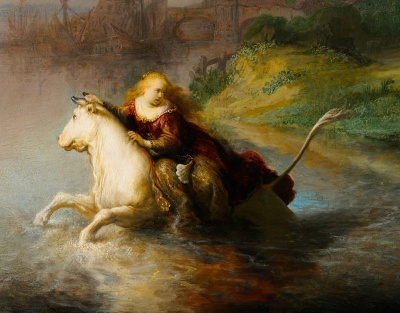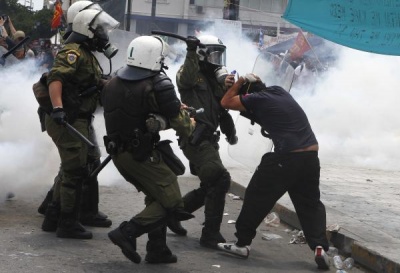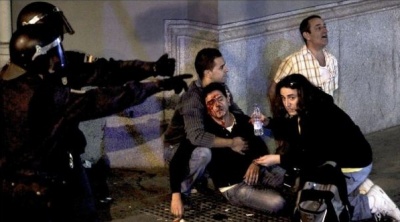Today, the European Union was awarded the peace Nobel prize [1]. The merit was "for over six decades contributed to the advancement of peace and reconciliation, democracy and human rights in Europe".
This prompted its president, José Manuel Barroso, to extend the honour to all its 500 million citizens~[2]. This flattery is nothing less than a cunning and dishonest identification of a political and economical organization with the European people.
"Europe" and "Union" are two noble words. The Greeks not only gave us democracy, they also named a continent with their beautiful language through a character of the Iliad, Ευρώπη, of such stupendous beauty that Zeus, under the appearance of a white bull, seduced and abducted her. As a reminder of this rapture, he also lighted the Taurus constellation, representing the emerged part of the bull at sea carrying out the princess to Crete. Beyond this captivating story, ancient Greece had, with its belief system, its philosophy and its political insights, started to rock the cradle of the Western civilization which, sublimated by other European countries, almost in turns, has made Europe the most thriving cultural complex to have ever existed.

"Union" defines a state of harmony and agreement. The "European Union" thus imposes, by its mere denomination, respect and admiration.
But words are treacherous. Orwell explained all too-well how we can attribute a noble word or expression to something that is blatantly its opposite, and hinder, through propaganda, brainwashing, political correctness and/or deceit, its perception as such.
Let us rather think of "Barroso's government" instead of "European Union" for the rest of this text, and proceed with the discussion of the honour extended to what is now only an organization.
Do European people even know what it is? It is not, in fact, called a government, it is called a "commission", and Barroso is the head "commissioner". The other commissioners do not occupy cabinets or hold ministries, as is usual in the political language to interface with the people, but a "portfolio". See if you know them, today's European rulers: Joaquín Almunia, László Andor, Catherine Ashton, Michel Barnier, Dacian Cioloş, John Dalli, Maria Damanaki, Štefan Füle, Máire Geoghegan-Quinn, Kristalina Georgieva, Karel De Gucht, Johannes Hahn, Connie Hedegaard, Siim Kallas, Neelie Kroes, Janusz Lewandowski, Cecilia Malmström, Günther Oettinger, Andris Piebalgs, Janez Potočnik, Viviane Reding, Olli Rehn, Maroš Šefčovič, Algirdas Šemeta, Antonio Tajani and Androulla Vassiliou.
If you are European, maybe you know one of them, as there is one per member state (27 in total). For example, I know myself Michel Barnier, as he is the French appointed one and had, as befits a politician, previous experience somewhere else at the national level. Namely, he was a minister of a previous French government, of "Agriculture and Fisheries". He is a minor political figure who held a minor office, but one is usually aware, even if at a distance, of the political panorama of one's country.
Not so with the European Union. Almost nobody knows what is going on, who is what, what they are doing and what they want to do. There is even a European Council and a council of European Union which are two different things. These commissioners are unelected, and there is a long record of shameful parodies of democracy surrounding what most strongly defines the European Union in its present form, the Treaty of Lisbon, that centralizes the EU and extends political power to its parliament at the detriment of national ones. Most notably, the only country that was consulted by vote, Ireland, was called to vote again, on the same text, after it first refused it. French people, who had previously strongly rejected the constitution by referendum (55% against), were denied a vote on the treaty as it was expected it would be likewise strongly rebutted, and it was directly accepted by the parliament instead.
But this is not what people see when they think of the "European Union". They see the frontiers of the continent, the CERN, the European civilization, the cultural diversity, today's friendship between its people who, it is true, have been sporadically at wars since the dawn of time and till a few years ago (last occurrence on European soils being the Yugoslav wars ending in 2001).
What they will see more and more in connection with the European Union, however, is this:


Despite EU fanatics telling you this has nothing to do, that the Greeks are fraudsters and the Spanish lazy, or whatever other explanation(s) (more will have to come for other countries in their wake), the EU character of the crisis is so obvious that even the Nobel reward had to mention this "side issue":
- The EU is currently undergoing grave economic difficulties and considerable social unrest. The Norwegian Nobel Committee wishes to focus on what it sees as the EU's most important result: the successful struggle for peace and reconciliation and for democracy and human rights. The stabilizing part played by the EU has helped to transform most of Europe from a continent of war to a continent of peace.
I know less of the Greek case, but the repression of the manifestations in Spain are an outrage to democracy and civilization. Unarmed people—no molotov cocktails, knives, not even stones—demonstrating peacefully, have been called "a threat to democracy" and charged and pursued and beaten till into bars and the central train station for symbolically surrounding the parliament.
Therefore, even admitting for the sake of the argument that the "grave economic difficulties" and the "considerable social unrest" are no factors to atone for peace achievements, let us quickly address the other points that purportedly still qualify the EU for this great honour that sides it along with Henry Dunant, Martin Luther King, Nelson Mandela and Desmond Tutu.
First, the "six decades", are by the most generous estimates, not even two, as the creation of the "European Union" dates to 1993, with the Maastricht treaty. The premises of a European political or economical cooperation had little if anything to do with the federalist project it became. As an illustration of this, de Gaulle—the greatest symbol of France's independence—was over a decade in power when all these institutions were being thought of and developed, with active French participation, which shows they were of a completely different nature and character by then~[3]. The Lisbon treaty, that most empowers the European Union, is from 2010 only. There is a clear correlation between what goes wrong in Europe and the amount of power delegated to Brussels, although accepting one as causing the other, or to which extent, is a problem of political conviction, and thus one which I wish to avoid here. But regardless of one's belief, the original statement attempts to identify, again, the European Union with a greater notion of a European cause and values, which is improper, inappropriate and just factually wrong. "The continent of peace" has not passed the test of time in terms of peace either. "Continent-wise", I already mentionned the Balkans, ten years ago. "Member-states-wise", the cold war ended in 1991, that is only two decades ago. The future, more importantly, is gloomy. Wars do take completely different forms with the passing of time. Even the almost simultaneous—on the historical scale—world wars had almost nothing in common. There is all reasons to assume that WWIII, if there should be such a thing, will not be a replica of any previous scenario but will take a completely novel form. It will only have in common with all wars what defines them: sufferings, ruin, violence, casualties, deaths, all this in large quantities and affecting civil populations, particularly the weak and innocents. If we are being promised this will never happen again within the EU boundaries, we are being foolishly patronized. Increasingly, the behaviour of the armed forces against their civilians in various countries of Europe start to look like the reasons why Lybia was attacked and bombed, incidentally, with an active participation of European military forces (this notion of a "continent of peace" implies domestic peace, not casualties in other countries caused by the said continent of peace; the term becomes even painful to utter. By this account, Obama indeed can figure on the same list of peace prize recipients).
Second, "human rights" are increasingly being challenged with the emergence of this super-state, with no identifiable rulers, in a scenario described by Virgil Gheorghiu in Ora 25. Since July 2005, France, to take this example that I know better, is under continuous red-alert of terrorist attacks, the so-called plan Vigipirate, which turns the country into a police state, affecting "all sectors of society"~[4]. I am personally always nervous when I see armed people, sometimes even with the finger on the trigger. Some people, for reasons of "trouble à la tranquillité des voyageurs" (not even "trouble to public order", literally "trouble to tranquillity of travellers"), have been detained and fined 945€ by a counter-terrorists squad, for a more than gentle protest~[5]. United-Kingdom, the historical champion of individual freedoms, is also increasingly turned into a police state handling arbitrary power to "security forces" (not even always the police), with some notable illustrations such as that of Richard O'Dwyer, a student who is facing now extraditions to the US for having put "links" to copyrighted material on his website, an absurdity made possible by counter-terrorist measures enacted in the post 9/11~[6]. Let us take an even larger perspective. No European nation has been always more virtuous than its neighbours. When Voltaire was fleeing France to find refuge in Germany (then Prussia), or Descartes to Netherlands, or Victor Hugo to Guernsey, it was a guarantee of their personal freedom that another state could give them asylum. Of course this goes in all directions: the Spanish republicans (in particular the Catalans) could escape to France during la Retirada, or Jewish people who fled Germany could escape Nazism before it took over other countries. And this shows the problem of having one political entity dominating everything. Now, our "continent of peace" offers no protection to the dissidents and it is left to Ecuador to provide political asylum to a political dissident~(!?). The European Arrest Warrant eradicates the powerful, resourceful relief of European sensibilities. There is no more balance of power and political equilibrium in Europe. We are foolish enough to accept this arrogant statement from unknown federal rulers: "we are a guarantee of what is right". This also alienates the populations as a French would still have respect for a political dissident seeking asylum in Great Britain or Finland, states that offer a reputable guarantee, but it is much more dubious for someone to find refuge in, say, Iran, Syria or even Russia that are however some of the only escape routes if, for whatever reason, you have NATO on your back (say because you leaked a video of them or their allies shooting journalists~[7]). We are increasingly siding with dictatorship and the one-and-unique-good-way of thinking.
Third, deficiencies in terms of democracy, which I have already touched upon, can be elaborated till exhaustion. The European Union gradually takes away from the people their right and power to rule their society. Local politicians and authorities are left powerless, in addition of, usually, not wanting to do anything anyway in the first place. This, however, makes a perfect excuse and is valid for all those who represent a national authority. See for example this long address from Alberto Garzón (?!) to the governor of "Banco de España", with the short, contradictory reply that, "we are not competent to address these issues" but still "we are independent from the Troika". As another clear example of the so-called policy laundering, let us quote Stavros Lambrinidis describing the very much decried ACTA (Anti-Counterfeiting Trade Agreement) as a "legislation laundering on an international level of what would be very difficult to get through most Parliaments." European Union, basically, dissolved the political and economical independence of its member states and is now ruling through a distant, complex and unaccountable organism with no concern for the people, that became a parameter. Corrupt politicians and corrupt moneylenders go hand in hand in this nebulous administrative construct which, at the outset, drags along notions of freedom, human rights and democracy that it tramples on at the same time.
Fourth and last, as for "the reconciliation", its exact opposite is growing between the north and south of Europe, which grow tensions that did not exist previously. I foresee that racism will develop as massive emigration from south European countries is underway to countries like Germany. I know personally a middle-age Spanish woman who had to put her life upside-down, learn German, leave her daughter with her divorced husband in Madrid, to work as an administrative in Stuttgart. I am not speaking here of the young Erasmus student or dynamic post-doc thirsty for new experience worldwide, but of someone forced to estrange herself from her culture, from her family and friends, late in life, for economic despair. When large communities of such people establish elsewhere and try to emulate in an hostile land the "comfort zone" of their country of origin, they will start to be regarded as a threat by the locals and a new type of intra-European hatred, till there afflicting only immigrants from third world countries, will be born. I wrote "comfort zone" because this is the expression that Passos Coelho, the Portuguese premier, used to invite unemployed people to leave their country~[8].
With this last attribute of "reconciliation" removed, it remains nothing from the Nobel statement to honour an organization which plays on the confusion between an economical and political entity on the one hand, and a culture, a continent, an ideal and a common aspiration of people on the other hand.
It is my belief that the increasing distance between the people and some complex, unknown, distant organs of power diluted in new concepts of governance aiming at an international "novus ordo seclorum" based on constant top-level security and a politically correct consensus will bring us, too arrogant to think otherwise, to more wars and/or revolutions. On the historical scale, nobody will even notice the "decades" of the Nobel prize between last time Europe was torn to piece and the next one.